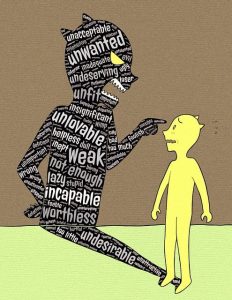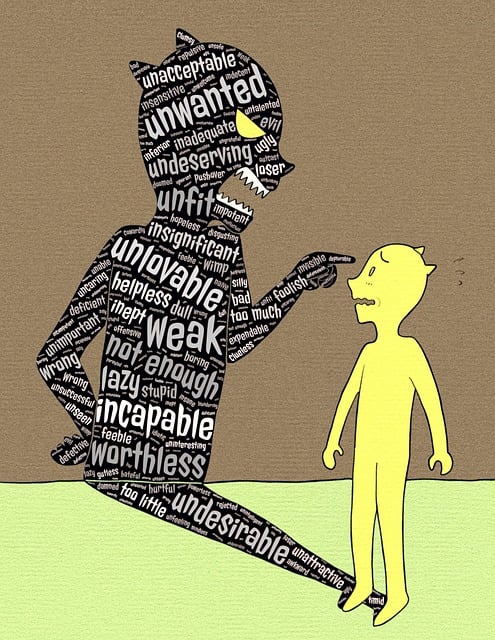How Psychotherapy can help you overcome your Inner Critic and Build Confidence
 We all carry an inner voice that narrates our daily experiences, decisions, and even mistakes. For some, this internal voice is supportive and can guide us through daily challenges, however, for many, it turns into the inner critic, a harsh, judgemental part of us that can shame and belittle us with thoughts such as:
We all carry an inner voice that narrates our daily experiences, decisions, and even mistakes. For some, this internal voice is supportive and can guide us through daily challenges, however, for many, it turns into the inner critic, a harsh, judgemental part of us that can shame and belittle us with thoughts such as:
- “You’re not good enough or not worthy enough”
- “You don’t deserve love”
- “You’ll never succeed”
Over time, this self-criticism can get in the way of our internal relationship with ourselves and erode our confidence. This lack of confidence can limit opportunities and strain our relationships with partners, friendships, work colleagues and even our children. It may even fuel anxiety, depression, OCD or perfectionism.
With the right therapeutic support, you can begin to transform your self-doubt into increased self-confidence and learn to quiet the inner critic’s voice.
What is the inner critic?
The inner critic is a self-protective but misguided part of us that often develops early in life. Harsh comments from parents, teachers, or peers can become internalized. For example: when I was around 8 years old, I excitedly relayed to a family member that I'd got the best mark in the class on a test, only to be told “don’t brag”.
From that moment and for a few years after, I continued to downplay my achievements, that inner critical voice even proclaimed that “anyone could get a degree, even a chimpanzee!"
What may have started as an attempt to keep us safe often becomes an inner saboteur, leading to:
- Low self-esteem and self-worth
- Procrastination and fear of failure
- Strained relationships
- Increased anxiety and depression.
The inner critic might on occasion masquerade as motivation, some clients tell me that if they don’t berate themselves, they may lose motivation to achieve, and this belief becomes the focus for our work together as over time this pattern usually holds us back more than it helps.
How Psychotherapy helps silence the Inner Critic
Different therapeutic approaches offer powerful tools to work with, rather than against your inner critic. I integrate Gestalt Therapy, EMDR and CBT in my practice, each of which helps in unique and complementary ways.
Gestalt Therapy: Awareness in the Here and Now
Gestalt therapy focuses on the present moment, noticing what happens here and now. It’s especially effective for:
- Recognising the inner critic’s voice.
- Understanding how it affects your thoughts, feelings and behaviours.
- Exploring different “parts” of yourself with compassion.
By becoming aware of how the critic shows up, you can begin to change your relationship with it. Instead of obeying its voice automatically, you learn to pause, reflect and choose new responses. I'll explore this more deeply in my next blog on Gestalt Therapy and the Inner Critic
EMDR Therapy: Reprocessing the Roots of self-criticism
Eye Movement Desensitisation and Reprocessing (EMDR) was originally developed for trauma but is now widely used for anxiety, OCD, insomnia, and low self-confidence.
Often, self-critical beliefs trace back to past experiences. A seemingly small childhood memory like being told off in class, can still echo in your adult life. Through EMDR, we work together to:
- Identify memories fuelling your inner critic.
- Reduce the emotional charge they carry.
- Free you from repeating old self-judgements.
Please see my webpage on EMDR for more information.
CBT Challenging Negative Thinking
Cognitive Behavioural Therapy (CBT) helps you identify distorted thought patterns and replace them with more balanced, realistic ones.
For example:
Inner Critic: “I always fail”
CBT Response: “Actually, I succeeded when I finished that project last month”
Over time, CBT can support you in building confidence, reducing anxiety and forming healthier habits.
If you would like more information on how the above approaches may be helpful to you, then please do feel free to contact me.
Practical tools to quieten the inner critic
Even outside therapy sessions, there are strategies you can use to reduce the critic’s power:
- Awareness Practice – Notice when the critic speaks. Simply labelling it as your “inner critic” can start to create distance.
- Compassionate Self-Talk – Replace “I’m worthless” with “I’m learning, and mistakes are part of growth.”
- Evidence Journaling – Write down successes and positive feedback to counter the critic’s narrative.
- Creative Expression – Journaling or art, eg drawing pictures of the inner critic as a caricature can help externalize the critic’s voice, if like me, your art skills are not well developed, you could look online for representations of your inner critic that fit for you.
Reframing the Inner Critics Role
Rather than trying to “eliminate” your inner critic, therapy helps you reframe it as a misguided protector.
For example:
Inner critic, “Don’t speak up in the meeting, you’ll embarrass yourself”
Reframe: “thanks for trying to protect me, but I can handle a little vulnerability, sharing my idea might even help the team.”
This shift allows you to respond with curiosity instead of hostility, softening the critics hold.
Final Thoughts
The inner critic doesn’t have to run your life. With Psychotherapy, awareness and compassion, you can transform that harsh voice into a supportive ally.
Whether you’re struggling with low self-esteem, anxiety, OCD or insomnia, therapeutic approaches like CBT, Gestalt Therapy and EMDR offer effective, evidence-based ways forward.
If you would like support in working with your inner critic, contact me today to explore therapy options.
The next time that harsh voice arises, pause… breathe….. and remember:
You are more than your thoughts. You are the one listening.







